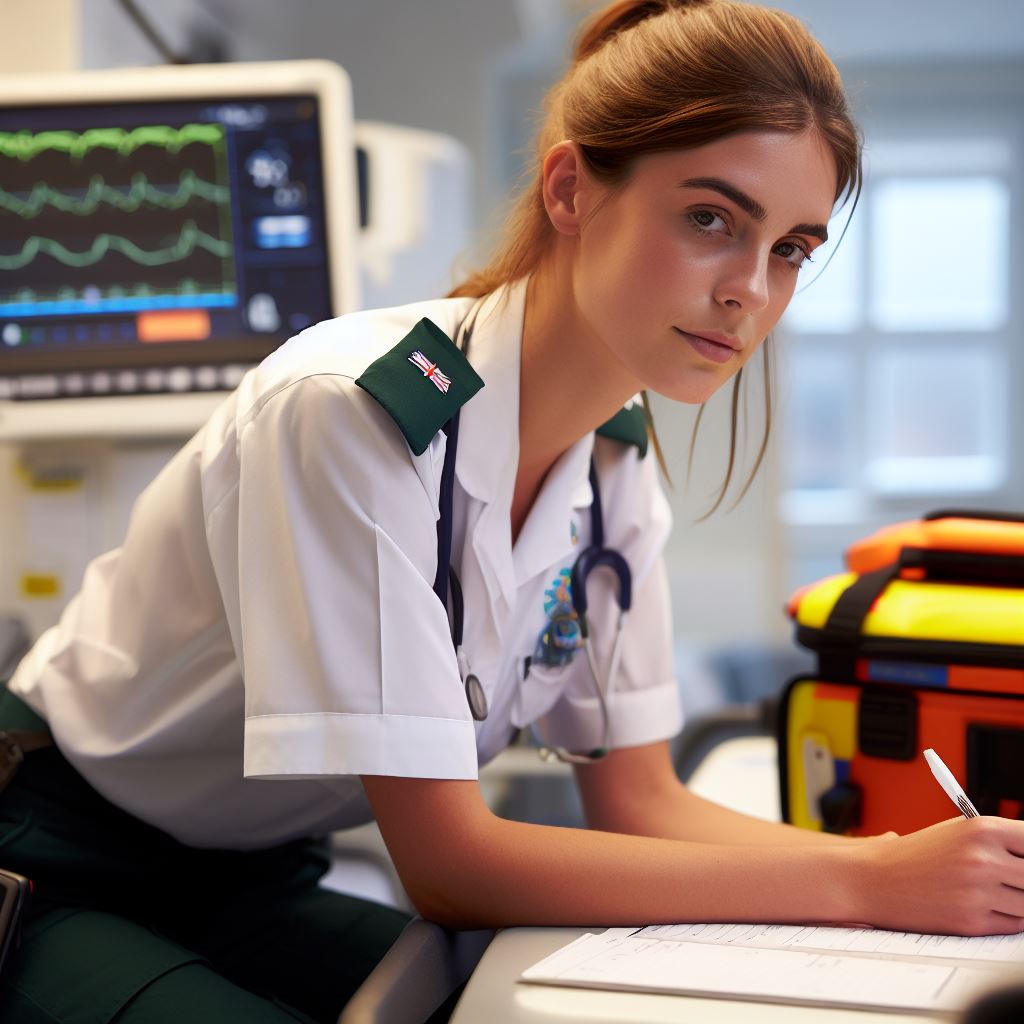Introduction
UK paramedic training
In the world of healthcare, paramedics play a vital role in saving lives and providing emergency medical care.
In the UK, paramedic training is rigorous and comprehensive, equipping individuals with the skills and knowledge required to handle a wide range of medical emergencies.
This training is crucial as paramedics are often the first responders on the scene, providing immediate care in critical situations.
With their quick thinking and expertise, paramedics make critical decisions and administer life-saving treatments, stabilizing patients before they can be transported to the hospital.
Importance of paramedics in the healthcare system
Through a combination of classroom instruction, practical exercises, and clinical placements, paramedic trainees learn how to assess patients, carry out medical procedures, administer medications, and provide effective pre-hospital care.
They also receive training in advanced life support techniques, such as cardiac monitoring and defibrillation, to handle the most severe cases.
The training curriculum covers various medical emergencies, including trauma, cardiac arrest, respiratory distress, and pediatric emergencies, preparing paramedics to handle diverse situations.
Additionally, paramedic training emphasizes the importance of effective communication and teamwork, as paramedics often work alongside.
Other emergency responders and healthcare professionals to ensure seamless care.
Paramedic training in the UK is crucial for the healthcare system, equipping individuals with the skills and expertise necessary to provide immediate and life-saving care in emergency situations.
Overview of paramedic profession
Paramedics play a crucial role in the field of emergency medical services, providing immediate care to those in need.
They are highly trained healthcare professionals who respond to emergency calls, assessing and treating patients in a pre-hospital setting.
Paramedics are responsible for administering life-saving treatments, such as CPR, managing trauma injuries, and stabilizing patients until they can be transported to a hospital.
They work alongside other healthcare professionals, including doctors and nurses, to provide comprehensive care.
These professionals must possess excellent communication and decision-making skills, as they often have to make critical judgments in high-pressure situations.
They must remain calm and composed, ensuring the safety and well-being of their patients.
Role and responsibilities of paramedics
- Responding to emergency calls promptly and efficiently.
- Assessing patients’ conditions and providing appropriate medical interventions.
- Administering medications and intravenous fluids as necessary.
- Performing advanced procedures, such as intubation and defibrillation.
- Collaborating with other healthcare providers to ensure continuity of care.
- Documenting all interventions and observations accurately.
- Transporting patients to medical facilities, while continuously monitoring their condition.
- Emotional support and reassurance to patients and their families.
- Maintaining and restocking medical equipment and supplies.
- Participating in ongoing training and professional development to stay updated with the latest advancements.
Significance of paramedics in emergency medical services
Paramedics are the first line of defense in emergency medical situations, playing a critical role in saving lives.
Their swift response and immediate medical interventions can make a significant difference in a patient’s outcome.
By providing timely care, paramedics can stabilize patients, prevent further deterioration, and initiate necessary treatments.
Their ability to quickly assess and determine appropriate courses of action is vital in emergency situations.
Additionally, paramedics play a crucial role in relieving pressure on hospital emergency departments.
Their interventions and expertise help reduce the number of non-emergency cases that burden hospitals, allowing them to prioritize more severe cases.
Paramedics’ presence in the field ensures a timely response to emergencies, reducing the overall response time and increasing the chances of successful outcomes.
Their dedication to continuous learning and skill development also contributes to the advancement of emergency medical services.
Paramedics are trained to adapt to new techniques and technologies, ensuring the highest quality of care for patients.
Their responsibilities involve assessing and treating patients in high-pressure situations, ensuring their safety and well-being.
Paramedics’ contributions are invaluable, as they make a significant difference in patients’ outcomes and alleviate strain on hospital resources.
If you aspire to become a paramedic, be prepared for the challenges and rewards that come with this noble profession.
Your dedication and commitment to learning and serving others can make a profound impact on the lives of those in need.
Entry requirements
Academic and personal qualifications required to become a paramedic in the UK
Entry requirements for UK paramedic training include academic qualifications and specific personal attributes.
Academic qualifications required to become a paramedic in the UK are essential. Prospective paramedics need to have at least five GCSEs, including English, Maths, and Science.
These subjects provide a foundation of knowledge that is important for the profession.
Additionally, a minimum of two A-Levels or equivalent qualifications, such as BTEC or Access to Higher Education courses, is required.
These academic qualifications demonstrate that individuals have the necessary academic ability to cope with the rigorous training.
However, it is not just academic qualifications that are crucial. Personal qualities and attributes are equally important for those aspiring to be successful paramedics.
Good communication skills are vital for effectively dealing with patients in distressing situations. Paramedics must be able to reassure and communicate clearly with individuals who may be anxious or in pain.
The ability to remain calm under pressure is essential, as paramedics often work in high-stress environments where quick thinking is needed to make critical decisions.
Empathy and compassion are key attributes needed to be a successful paramedic.
Being able to understand and relate to individuals’ emotions allows paramedics to offer emotional support alongside medical assistance.
A paramedic is often the first point of contact for individuals facing traumatic situations, and showing empathy can greatly reduce anxiety and fear.
Personalized UK Career Consulting
Receive tailored career guidance designed just for you. Get actionable steps and expert support to boost your career in 1-3 days. Take control of your career now.
Get StartedImportance of having certain skills and attributes for the profession
Strong problem-solving skills are a must for paramedics. Every emergency presents unique challenges that require quick thinking and the ability to adapt to complex situations.
Paramedics need to be able to assess the situation, make decisions promptly, and take appropriate actions to ensure the best possible outcome for the patient.
Physical fitness is also an important requirement for paramedics. The job can be physically demanding, requiring paramedics to lift and carry patients, sometimes in difficult conditions.
Good fitness levels are vital to ensure the safety of both the paramedic and the patient.
They often work alongside other emergency services, such as police officers and firefighters, as well as healthcare professionals in hospitals.
Being able to collaborate and communicate effectively with others is essential for providing the best possible care in complex situations.
Lastly, a commitment to continuous learning and development is essential for paramedics.
The medical field is constantly evolving, and paramedics need to stay updated with the latest practices and procedures.
This commitment ensures that paramedics can provide the highest standard of care to patients.
In review, becoming a paramedic in the UK requires a combination of academic qualifications and personal attributes.
Academic qualifications provide the necessary foundation, while personal attributes such as good communication skills, empathy.
Problem-solving abilities, physical fitness, teamwork, and a commitment to learning are essential for success in the profession.
Prospective paramedics should carefully consider these requirements and strive to develop or improve their skills and qualities to excel in this challenging and rewarding career.
Training Pathways for Paramedic Training in the UK
When it comes to paramedic training in the UK, there are several pathways available for aspiring paramedics to choose from.
These pathways include university degrees and apprenticeships. Let’s explore the pros and cons of each pathway:
University Degrees (Bachelor’s or Master’s Programs)
Pros
- Extensive theoretical knowledge and practical skills training provided through structured courses.
- Opportunity to specialize in specific areas of paramedicine through advanced modules.
- Greater prospects for career advancement and leadership roles with a higher education qualification.
- In-depth understanding of the healthcare system and interdisciplinary collaboration.
Cons
- Longer duration of study, usually spanning three to four years for a Bachelor’s degree or one to two years for a Master’s.
- Higher tuition fees compared to apprenticeships or vocational training.
- Limited practical experience during the academic program, which may require additional training or internships.
- Competition for university placements can be fierce due to limited spots available.
- Not suitable for individuals who prefer hands-on training over academic study.
Apprenticeships
Pros
- Combination of on-the-job training and classroom-based learning, providing practical experience from the start.
- Opportunity to earn while you learn, as apprentices are usually paid a salary during their training.
- Developing essential skills in real-life situations under the guidance of experienced paramedics.
- No tuition fees as the training is financed by the apprentice’s employer or the government.
- Increased job prospects and potential employment with the same organization upon completion of apprenticeship.
Cons
- Less focus on theoretical knowledge compared to university degrees, may require additional self-study to enhance understanding
. - Limited specialization options and fewer opportunities for career advancement without further qualifications.
- Competitive application process for limited apprenticeship positions.
- Possible challenges in coordinating academic coursework with on-the-job training commitments.
- Less flexibility for individuals who desire a university experience or prefer a structured academic program.
Ultimately, the choice between university degrees and apprenticeships for paramedic training depends on individual preferences, career aspirations, and personal circumstances.
Those who value comprehensive theoretical knowledge and academic qualifications may opt for university degrees.
While individuals seeking hands-on experience and practical skills development may find apprenticeships more appealing.
It is important to carefully consider the pros and cons of each pathway before making a decision, ensuring that it aligns with one’s goals and learning style.
Read: How UK Nurses Balance Work and Personal Life
UK Paramedic Training: What to Expect
When it comes to becoming a paramedic in the UK, the training is rigorous and comprehensive. Understanding the duration and structure of the training program is essential for aspiring paramedics.
Duration of Training
The typical duration of paramedic training programs in the UK can vary, but it usually takes around 2 to 3 years to complete.
During this time, aspiring paramedics undergo a combination of practical placements and classroom-based learning to develop the necessary skills and knowledge.
Structure of Training
The structure of paramedic training programs in the UK is designed to provide a well-rounded education to future paramedics.
Classroom-based Learning
In the classroom, students learn the theoretical foundations of paramedicine, including anatomy, physiology, pharmacology, and patient assessment.
Here are some of the components of classroom-based learning:
- Medical terminology
- Anatomy and physiology
- Pathophysiology
- Pharmacology
- Emergency procedures
- Medical ethics and law
These classroom sessions are crucial in providing a solid knowledge base for future paramedics.
Your Dream Job Starts with a Perfect CV
Get a tailored CV and cover letter that captures your unique strengths and stands out in your industry. Let us help you make an unforgettable first impression.
Get StartedPractical Placements
Paramedic training also involves practical placements, where students apply what they have learned in real-life situations under the guidance of experienced paramedics.
Here are some of the components of practical placements:
- Ambulance ride-alongs
- Hospital rotations
- Emergency department experience
- Specialized clinical placements (e.g., maternity ward, pediatric unit)
These placements allow students to gain hands-on experience in different healthcare settings and develop essential skills in pre-hospital care.
Assessments and Examinations
Throughout the training program, students are assessed through a combination of written exams, practical assessments, and clinical evaluations.
These assessments ensure that students are progressing and meeting the required standards to become competent paramedics.
Professional Development
Paramedic training doesn’t end with qualification. Continuous professional development is crucial for paramedics to stay updated with the latest advancements in the field.
Once qualified, paramedics may pursue further specialized training or take part in ongoing training opportunities offered by their employers.
In short, paramedic training in the UK is intensive and demanding, but it prepares individuals for the challenges they will face in their future careers.
It combines classroom-based learning with practical placements to develop both theoretical knowledge and hands-on skills.
With dedication and commitment, aspiring paramedics can embark on a rewarding journey of saving lives and making a difference in the community.
Read: Advancing Your Nursing Career in the UK
Curriculum and subjects covered
Main topics and subjects that are covered during paramedic training
- Anatomy and Physiology: Paramedic training begins with a comprehensive study of the human body, focusing on its structure and function.
- Pathophysiology: Students learn about various diseases and disorders to understand the changes that occur in the body.
- Pharmacology: Paramedics need to have a solid understanding of medications, their uses, and potential side effects.
- Trauma Management: Emphasis is placed on assessing and managing traumatic injuries like fractures, head injuries, and burns.
- Cardiology: Students study the physiology of the heart, various cardiac conditions, and perform ECG interpretation.
- Respiratory Care: Training covers airway management, oxygen therapy, and the treatment of respiratory emergencies.
- Obstetrics and Gynecology: Paramedics learn about childbirth, pregnancy-related emergencies, and how to provide pre-natal care.
- Pediatrics: Special attention is given to pediatric emergencies, including recognizing and managing illnesses and injuries in children.
- Geriatrics: Students gain knowledge and skills to effectively care for elderly patients, considering their unique healthcare needs.
- Mental Health: Paramedics are taught how to approach and provide care for individuals experiencing mental health crises.
- Medical Emergencies: Training covers a wide range of medical conditions like diabetes, seizures, allergic reactions, and strokes.
- Trauma Emergencies: Extensive training is provided on managing various traumatic injuries encountered in accidents or assaults.
- Advanced Life Support: Paramedics learn advanced techniques such as endotracheal intubation and administration of intravenous medications.
- Patient Assessment: A significant portion of training is devoted to developing critical assessment skills to evaluate patients comprehensively.
- Emergency Medical Services (EMS) Operations: Students understand the responsibilities, protocols, and communication strategies within EMS.
Emphasis on emergency care, medical procedures, and patient assessment
Paramedic training places a strong emphasis on emergency care, as paramedics are often the first point of contact in life-threatening situations.
Students are trained to quickly assess the scene, initiate appropriate emergency procedures, and provide essential care.
Medical procedures like airway management, intravenous therapy, and administering medications are extensively taught, ensuring paramedics can confidently perform these tasks in emergency situations.
Moreover, patient assessment skills are honed through simulated scenarios and hands-on experience.
Paramedics learn to systematically evaluate patients, identify potential threats to their health, and make critical decisions regarding the course of treatment.
By covering a comprehensive curriculum, focusing on emergency care, medical procedures, and patient assessment, paramedic training equips individuals with the necessary knowledge and skills to provide vital pre-hospital care.
Read: UK Surgeons’ Salary Guide: Expectations vs Reality
Optimize Your LinkedIn for Success
Boost your LinkedIn profile with a professional bio, keyword-rich headline, and strategic recommendations that attract recruiters. Stand out from the crowd and get noticed.
Optimize Now
Practical Experience and Placements
Practical experience plays a vital role in paramedic training, equipping students with the necessary skills to succeed in this demanding profession.
Importance of Practical Experience
- Hands-on training allows paramedic students to apply theoretical knowledge in real-life scenarios.
- Practical experience helps build confidence and develops critical thinking skills essential for making split-second decisions.
- Working directly with patients under supervision prepares aspiring paramedics for the challenges they will face.
- Experiential learning enhances empathy and communication skills, enabling better patient interactions.
- Practical experience provides an opportunity to understand the physical, emotional, and psychological aspects of healthcare.
- Through hands-on training, students acquire proficiency in using medical instruments and equipment.
Role of Ambulance Placements and Practical Settings
- Ambulance placements offer paramedic students the chance to observe and learn from experienced professionals in real emergency situations.
- Working in various practical settings, such as hospitals and specialized departments, exposes students to diverse patient care scenarios.
- These placements enable trainees to witness the entire continuum of pre-hospital care, including assessment, treatment, and transportation.
- Experiencing different work environments cultivates adaptability, a crucial skill for paramedics who encounter unpredictable situations.
- Students learn to collaborate with different healthcare professionals, enhancing their ability to work within a multidisciplinary team.
- Practical placements also provide an opportunity to observe and assist in procedures relevant to the paramedic practice.
- Trainees develop efficient time management skills as they prioritize tasks and handle emergencies effectively.
- Placements foster a deeper understanding of the challenges faced by paramedics and the rewards of providing immediate, life-saving care.
- Real-life settings expose students to the realities of the profession, helping them determine if it is a suitable career path.
- By actively participating in patient care, students develop strong problem-solving abilities required for effective emergency response.
In general, practical experience and placements are integral components of paramedic training.
The hands-on nature of this training equips students with the necessary skills, fosters professional growth, and prepares them for the challenges they will face in their career.
Ambulance placements and other practical settings offer invaluable opportunities for students to apply theoretical knowledge, observe professionals in action, and develop the crucial skills needed to thrive as paramedics.
Read: The Impact of Technology on Nursing in the UK
Assessments and qualifications
Different assessments and examinations that paramedic trainees must pass
Assessments and qualifications play a crucial role in the training of paramedics in the UK.
Here are the different assessments and examinations paramedic trainees must pass, as well as the qualifications awarded upon successful completion of the training program.
Initial Assessments
Before commencing the training, potential paramedic trainees must go through a rigorous selection process. This includes various assessments such as aptitude tests, interviews, and physical fitness evaluations.
Theory Examinations
Throughout the training program, trainees are required to undertake multiple theory examinations.
These exams cover a wide range of medical knowledge, including anatomy, physiology, pharmacology, and emergency care protocols.
Practical Assessments
In addition to theory exams, practical assessments are conducted to evaluate a trainee’s hands-on skills.
Trainees must demonstrate proficiency in performing various procedures, such as CPR, administering medications, and managing trauma cases.
Scenario-Based Assessments
Trainees are often evaluated through scenario-based assessments, where they are presented with simulated emergency situations.
This allows assessors to gauge their ability to make quick, accurate decisions and effectively manage patient care.
Clinical Placements
As part of the training, trainees are placed in real-life clinical settings, such as hospitals and ambulance services.
During these placements, their performance and competence are assessed by experienced paramedics and medical professionals.
Qualifications awarded upon successful completion of the training program
Upon successful completion of the training program, paramedic trainees are awarded with several qualifications:
Diploma in Paramedic Practice
This is the minimum qualification required to practice as a paramedic in the UK. It is awarded by the College of Paramedics upon successful completion of the training program and meeting the necessary standards.
Registration with the Health and Care Professions Council (HCPC)
Trainees who have obtained their Diploma in Paramedic Practice must register with the HCPC to legally practice their profession.
Registration ensures that paramedics meet the required standards of proficiency and adhere to the code of conduct.
Additional qualifications
Depending on individual career goals and personal development, paramedics may pursue additional qualifications.
These could include specialized certifications in advanced life support, critical care, or specific areas such as pediatric or geriatric care.
Continuing Professional Development (CPD)
Paramedics are encouraged to engage in ongoing CPD activities to enhance their knowledge and skills throughout their careers.
This may include attending conferences, workshops, and undertaking further education.
It is important to note that maintaining these qualifications requires paramedics to meet certain standards and undergo periodic revalidation processes.
This ensures that paramedics stay up-to-date with the latest advancements in medical knowledge and continue to provide high-quality care to patients.
Essentially, the assessments and qualifications in the UK paramedic training are designed to ensure trainees acquire the necessary knowledge and skills to become competent paramedics.
By passing various assessments and examinations, trainees obtain the Diploma in Paramedic Practice and become eligible for registration with the HCPC.
Continuous learning and professional development further contribute to the growth and excellence of paramedics throughout their careers.
Continuing professional development
Continuing professional development is crucial for paramedics, as it ensures they stay updated and competent in their field.
Importance of ongoing learning and development:
- Enhances knowledge and skills, enabling paramedics to provide the highest standard of care.
- Keeps paramedics up-to-date with current practices, protocols, and advancements in medical technology.
- Builds confidence and professionalism, ensuring paramedics can handle any situation they may encounter.
- Promotes critical thinking and problem-solving abilities, enabling paramedics to make informed decisions.
- Increases job satisfaction and motivation by offering opportunities for personal and career growth.
Opportunities for further training and career advancement:
- Specialization: Paramedics can choose to specialize in areas such as critical care, pediatric care, or trauma care.
- Advanced Life Support (ALS) courses: These courses provide paramedics with advanced skills and knowledge.
- Postgraduate degrees: Paramedics can pursue postgraduate degrees in subjects like emergency medicine or paramedic science.
- Leadership and management courses: These courses develop paramedics’ leadership skills for potential managerial roles.
- Research and academia: Paramedics can engage in research or become educators, sharing their expertise with future paramedics.
- Conferences and workshops: Attending these events allows paramedics to learn from experts and exchange knowledge with peers.
- Online learning: Paramedics can access online courses and webinars to enhance their knowledge and skills at their own pace.
- Clinical placements and secondments: These opportunities enable paramedics to gain experience in different healthcare settings.
- Career progression pathways: Paramedics can advance into roles such as team leaders, supervisors, or specialist practitioners.
- Mentorship programs: Paramedics can benefit from mentorship programs to receive guidance and support from experienced professionals.
It is important for paramedics to actively seek out these opportunities and take responsibility for their professional development.
By continuously learning and developing their skills, paramedics contribute to providing the best possible care to patients and maintaining high standards within the profession.
Furthermore, ongoing learning and development also benefit the paramedics themselves, as they can progress in their careers and achieve personal fulfillment in their chosen profession.
By participating in various forms of training and exploring different avenues of advancement, paramedics can continue to grow and excel in their roles.
The commitment to continuing professional development ensures paramedics are always ready to provide the highest level of care to those in need.
Conclusion
Paramedic training in the UK plays a crucial role in ensuring high-quality emergency medical care.
Through rigorous education and practical experience, paramedics are equipped with the necessary skills to assess and treat patients effectively.
They learn about various medical conditions, emergency procedures, and communication skills. Additionally, they undergo extensive training in ambulance operations and driving.
This comprehensive training enables paramedics to handle critical situations with confidence and provide immediate medical assistance to those in need.
The demand for well-trained paramedics will continue to grow as the healthcare industry evolves, emphasizing the importance of ongoing training and professional development.
So, paramedic training remains vital in maintaining the standard of emergency care in the UK.
[E-Book for Sale]
500 Cutting-Edge Tech Startup Ideas for 2024 & 2025: Innovate, Create, Dominate
$19.99 • 500 Tech Startup Ideas • 62 pages
You will get inspired with 500 innovative tech startup ideas for 2024 and 2025, complete with concise descriptions to help you kickstart your entrepreneurial journey in AI, Blockchain, IoT, Fintech, and AR/VR.




